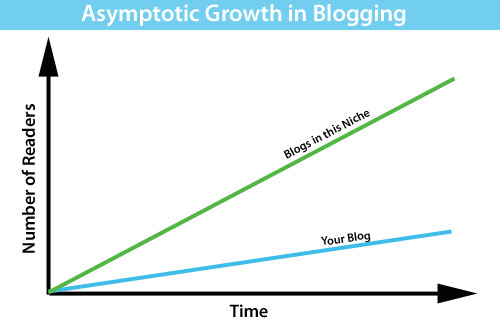Paul Jacobson is a lawyer and long-time South African blogger. He wrote a post today, “Blogging is, like, so 2007”, that triggered some thoughts I’ve had on blogging and growth. In it he talks about how the there are many more ways to publish your thoughts to the web other than your blog (lifestreaming), and how that fractured state leads to less value being placed in blogging.
Asymptotic Growth in Publishing
I think there’s more to it than just the number of ways to communicate, it’s also about the number of new people who come online each year with their own blog, Twitter comments, Facebook Note, etc. Each year there is more content being put online and so your own voice matters less relative to the sum of all noise out there. This applies to niches, and the web in general, and I refer to it as asymptotic publishing growth.
Put another way, even if your blog grows more readers every year, it shrinks in relation to the whole.

This is particularly apparent to first-movers in any new platform. At first you have an inordinate amount of “voice” in a specific sphere, which seems to erode over time.
Islands of Influence
One of my theories on what happens as these environments mature is that as they grow and there becomes more and more options for readers, that there tends to be a coalescing or readers around a certain few blogs or publishers. Though every one of the publishers is likely growing in size, there are certain “keystone” blogs to each niche that have an inordinate amount of influence relative to the general blog in that space.
For example, as a technology blog reader, I might visit 10 blogs every day. However, three of those are likely the same as everyone else.
I compare this to teen hangout locations. There are a lot of places to hang out, and everyone tends to go to a few of their favorite places. However, everyone knows the place to be on Friday night, and that’s the place where the majority of teens go.
In Summary
There will always be more noise in the blogosphere, or whichever publishing platform is your choice of the moment, than when you first started in it. However, those that provide the most value to the readers will continue to grow and also garner a greater relative audience than their peers.
Basically, asymptotic growth is a truth that we all have to live with, but there will always be islands of influence.
August 21, 2008 at 11:04 am
Thanks for the mention. I guess when it comes to that noise it is probably best not to pay too much attention to all the “dark matter” out there are focus on the value/benefits derived from the sites/connections that mean most to you. Trying to cope with all the background noise too is a recipe for information overflow and long-term insanity.
August 21, 2008 at 2:05 pm
@ Paul – You’ve got that right, there is a real danger from information overload today, thus the reason I steer clear of FriendFeed – it felt to much like I was trying to drink from a firehose. I choose my touchpoints carefully: blog, twitter and Skype. Of course, that will probably change over the years, but it works for now.
August 21, 2008 at 7:42 pm
Hash @ the information overload along with the reductionism of language make it impossible to be where we were in 2006 or even 2007. It does make me sad that I have to make a conscious effort to visit many of the blogs I was reading in 2005/6 from countries far and wide. Because there not just so many blogs but so many mediums you find yourself limited to as you say just a few regular blogs a day which is a shame. I feel I loose out because I havent the time to visit blogs outside of my own small circle say in India, Panama, Trinidad, the US etc.
Given that we have a finite amount of time and the human brain has a capacity limit how will be manage the increasing flow of information in the future ?
August 21, 2008 at 10:19 pm
On the flip side from info overload is providing and trying to stay up with all the ways to stay connected. Beyond keeping your blog(s) up to date, but staying up on facebook, myspace, twitter, and all the other billion ways to be connected these days. Personally, I drew the line at twitter. I just could not handle signing into a service every few hours to let people know what I was doing. Not only was that spending way to much time to tell people about me, it was to much info for others to know about me. Already to much of my life is going virtual, I need to plug back into the real world and not rely to much on the virtual world for my community.
Sudan should help fix that problem 😉
August 22, 2008 at 7:51 am
Taylor you have a point but Twitter and similar services dont have to be simply personal status updates. I use it as a feed update on my blog posts and for micro-blogging anything that is interesting but which I dont want to write a whole blog post for. Still you have a point that we all probably spend way too much time online and at some point we will reach an optimum.
August 24, 2008 at 6:45 am
There is always the risk of too much information both online and offline.
However, the existence of other Radio stations for instance doesn’t stop others from launching.
The Long Tail theory is such that endless choice creates unlimited demand. That way, everone can be relevant, albeit in a smaller way.
You can download “The Long Tail” eBook free at http://www.peternjenga.com/resources
Cheers!